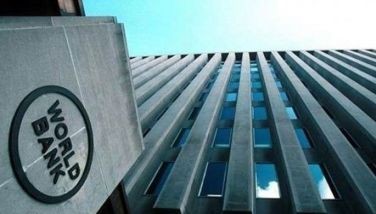OFW remittances surge 19.4% to $706M in June
August 13, 2004 | 12:00am
After declining in May, remittances from overseas Filipino workers recovered dramatically in June, surging by 19.4 percent as workers adjusted to the strict bank requirements imposed in the Middle East.
Data released by the Bangko Sentral ng Pilipinas (BSP) yesterday show that OFW remittances reached $706 million in June, bringing the six-month total to $4 billion, about 2.6 percent higher than last year’s first semester total.
June’s remittance level came in the wake of May’s decline that resulted from the tightening of regulations in the Middle East, requiring Filipino workers to comply with strict documentary requirements before being able to remit funds to the Philippines.
According to the BSP, the surge was also helped along by the expansion in the remittance operations of Philippine banks, including the on-line remittance facilities that allowed inward transfers.
The BSP said there was also a notable expansion in tie-ups between Philippine institutions and financial institutions in countries where there are significant numbers of deployed OFWs.
Moreover, the BSP noted that there was an increase in the deployment of overseas Filipino workers particularly in Kuwait, Saudi Arabia and United Arab Emirates.
Quoting the Philippine Overseas Employment Administration, the BSP said the total number of deployed OFWs grew by 9.2 percent to 501,713 during the first semester of this year compared to last year.
The BSP said there was an increase in fund transfers from Hong Kong, Saudi Arabia, Singapore, UAE and the US which offset the decline in remittances from Japan and the UK.
Remittances slowed down in April followed by a decline in May but BSP officials said workers have more or less adjusted to the tightening of anti-money laundering measures in the Middle East.
The BSP said the implementation of the Anti Money Laundering (AML) and Counter Terrorist Financing (CTF) regulations in the Middle East, particularly Saudi Arabia, restricted the remittance of dollars into the Philippines.
"Banks in Saudi Arabia now require complete documentation and examination prior to remittance by overseas workers," said the BSP, adding that remittance centers in most countries have started to implement strict screening procedures.
The BSP said this would provide incentives for OFWs to remit their earnings to non-bank channels which are not captured by the banking system.
According to the BSP, will increases in fund transfers activities in Hong Kong, US and Italy will soften the impact of the decline in remittances from traditional labor host countries such as Japan, UK and Saudi Arabia.
The BSP noted that Saudi Arabia has been strictly implementating its anti-money laundering law which calls for a tight examination of fund transfers and the submission of certain documents by overseas workers prior to remittance.
"Consequently, OFW remittances from Saudi Arabia dropped by 7.6 percent since the policy was implemented," the BSP reported. This is an indication that Filipinos working in Saudi Arabia have not been able to present the proper documentations required by Saudi law.
Data released by the Bangko Sentral ng Pilipinas (BSP) yesterday show that OFW remittances reached $706 million in June, bringing the six-month total to $4 billion, about 2.6 percent higher than last year’s first semester total.
June’s remittance level came in the wake of May’s decline that resulted from the tightening of regulations in the Middle East, requiring Filipino workers to comply with strict documentary requirements before being able to remit funds to the Philippines.
According to the BSP, the surge was also helped along by the expansion in the remittance operations of Philippine banks, including the on-line remittance facilities that allowed inward transfers.
The BSP said there was also a notable expansion in tie-ups between Philippine institutions and financial institutions in countries where there are significant numbers of deployed OFWs.
Moreover, the BSP noted that there was an increase in the deployment of overseas Filipino workers particularly in Kuwait, Saudi Arabia and United Arab Emirates.
Quoting the Philippine Overseas Employment Administration, the BSP said the total number of deployed OFWs grew by 9.2 percent to 501,713 during the first semester of this year compared to last year.
The BSP said there was an increase in fund transfers from Hong Kong, Saudi Arabia, Singapore, UAE and the US which offset the decline in remittances from Japan and the UK.
Remittances slowed down in April followed by a decline in May but BSP officials said workers have more or less adjusted to the tightening of anti-money laundering measures in the Middle East.
The BSP said the implementation of the Anti Money Laundering (AML) and Counter Terrorist Financing (CTF) regulations in the Middle East, particularly Saudi Arabia, restricted the remittance of dollars into the Philippines.
"Banks in Saudi Arabia now require complete documentation and examination prior to remittance by overseas workers," said the BSP, adding that remittance centers in most countries have started to implement strict screening procedures.
The BSP said this would provide incentives for OFWs to remit their earnings to non-bank channels which are not captured by the banking system.
According to the BSP, will increases in fund transfers activities in Hong Kong, US and Italy will soften the impact of the decline in remittances from traditional labor host countries such as Japan, UK and Saudi Arabia.
The BSP noted that Saudi Arabia has been strictly implementating its anti-money laundering law which calls for a tight examination of fund transfers and the submission of certain documents by overseas workers prior to remittance.
"Consequently, OFW remittances from Saudi Arabia dropped by 7.6 percent since the policy was implemented," the BSP reported. This is an indication that Filipinos working in Saudi Arabia have not been able to present the proper documentations required by Saudi law.
BrandSpace Articles
<
>
- Latest
- Trending
Trending
Latest























